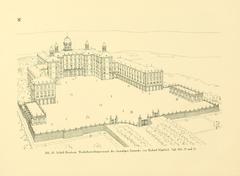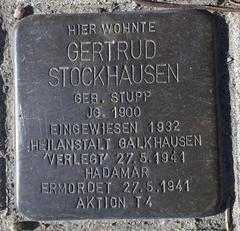Bergisch Gladbach Observatory Visiting Hours, Tickets, and Travel Guide
Date: 14/06/2025
Introduction
Situated in the scenic Cologne–Bonn region of North Rhine-Westphalia, the Bergisch Gladbach Observatory stands as a distinguished center for astronomical observation and public engagement. Established by Wolf Bickel, Germany’s most prolific amateur discoverer of minor planets, the observatory embodies both personal dedication and global scientific impact. While primarily a private facility, Bergisch Gladbach Observatory opens its doors for special events, guided tours, and educational outreach, making it a rewarding destination for astronomy enthusiasts, families, and travelers seeking a blend of science, culture, and the natural beauty of the Rhineland. This guide provides comprehensive information on visiting hours, tickets, accessibility, scientific highlights, and local attractions to help you plan an enriching visit. For additional details, see the City of Bergisch Gladbach’s history page and the Go Astronomy portal.
Table of Contents
- Introduction
- Historical Background and Key Figures
- Visiting Information: Hours, Tickets, and Accessibility
- Visitor Experience and Public Outreach
- Scientific Highlights and Research Contributions
- The Observatory’s Role in Regional Science and Culture
- Local Attractions and Travel Tips
- Frequently Asked Questions (FAQ)
- Conclusion and Further Resources
Historical Background and Key Figures
Origins and Construction
Founded in the mid-1990s by Wolf Bickel, the Bergisch Gladbach Observatory is a testament to amateur initiative and scientific excellence. Bickel’s passion for astronomy began in his youth and ultimately led him to build a 0.6-meter telescope at his private observatory, located approximately 30 kilometers from his home. His craftsmanship and dedication enabled significant observational work, particularly in the field of asteroid discovery.
Wolf Bickel’s Contributions
Wolf Bickel, born in Bensberg in 1942, leveraged his background in electrical engineering to become Germany’s foremost amateur astronomer. Between 1995 and 2010, he discovered 665 numbered minor planets, surpassing many professional astronomers. In recognition, asteroid 4324 Bickel was named in his honor. Another of his discoveries, asteroid 12564 Ikeller, commemorates his wife, Ingeborg Bickel-Keller.
The Observatory’s Role in German Astronomy
Unlike many institutional observatories, Bergisch Gladbach is a privately operated facility that has achieved international recognition for its scientific contributions. It stands as a symbol of how individual initiative can have a global impact on celestial research.
Bergisch Gladbach: Scientific and Cultural Heritage
Bergisch Gladbach’s transformation from an industrial hub to a center for knowledge and innovation is reflected in the observatory’s mission. The site links local heritage with contemporary scientific achievement, reinforcing the city’s identity as a progressive and culturally rich destination.
(City of Bergisch Gladbach – Official History Page)
Visiting Information: Hours, Tickets, and Accessibility
Visiting Hours
- Regular Hours: The Bergisch Gladbach Observatory does not maintain standard public visiting hours due to its private status.
- Public Events: Access is available during special events, open nights, and by pre-arranged visits for groups and educational institutions.
- Booking: Advance arrangements are essential. Contact the observatory directly or coordinate through local tourism offices for the latest information.
Tickets and Fees
- General Admission: Free during public events; some workshops or guided tours may require a modest fee.
- Booking: Tickets for special activities should be reserved in advance; purchase options are typically available online or through local tourism channels.
Accessibility
- Location: Approximately 30 kilometers from Cologne, accessible by car and public transport.
- Transport: From Cologne, take the S-Bahn S11 to Bergisch Gladbach, followed by a local bus or taxi.
- Parking: Limited on-site; public transport is recommended, especially for larger events.
- Facilities: The observatory strives for accessibility. Those with mobility needs should inquire ahead regarding available accommodations.
Visitor Experience and Public Outreach
Arrival and Practical Tips
- Directions: Easily reached from Cologne by S-Bahn and bus, or by car.
- Parking: Available but limited—arrive early or use public transport.
- What to Bring: Dress appropriately for outdoor night events; a red-filtered flashlight is recommended for night sky sessions.
Guided Tours and Educational Programs
- Tours: Expert-led tours introduce visitors to the observatory’s history, telescopes, and ongoing research.
- Workshops: Designed for all ages, workshops cover planetary science, telescope operation, and the fundamentals of astronomy.
- School Programs: The observatory partners with local schools and universities to promote STEM education and inspire future scientists.
Night Sky Observation Events
- Events: Scheduled around meteor showers, eclipses, and planetary alignments, often requiring advance registration.
- Equipment: Visitors may use professional telescopes under expert guidance and are welcome to bring their own.
Interactive Exhibits and Hands-On Activities
- Exhibits: Scale models, instrument displays, and multimedia presentations explain astronomical concepts.
- Activities: Telescope-building and optics workshops are popular, especially for families and school groups.
Special Events and Community Outreach
- Annual Festivals: Themed evenings and public lectures by visiting scientists.
- Outreach: The observatory actively participates in community programs, bringing astronomy to schools and libraries.
Visitor Amenities
- Facilities: Restrooms, a gift shop with astronomy-themed merchandise, and a café.
- Information: Multilingual tours and materials (primarily in German and English), with accommodations available for diverse audiences and accessibility needs.
Scientific Highlights and Research Contributions
- Astrophysics: Monitoring variable stars and exoplanets; collaboration with international research networks.
- Solar System Studies: Observations of planets, asteroids, and comets contribute to European and global scientific efforts.
- Instrumentation: Partnerships with local companies such as RI Research Instruments GmbH for testing and developing advanced optics and detectors.
- Planetary Science: Contributions to missions like NASA’s InSight, analyzing Mars data.
(HAL Open Archive on Bensberg Observatory Research) (RI Research Instruments GmbH History)
The Observatory’s Role in Regional Science and Culture
The Bergisch Gladbach Observatory is part of a broader scientific and educational landscape within North Rhine-Westphalia, complementing universities, museums, and technology centers. It is a hub for collaboration, citizen science, and public engagement, reinforcing the city’s motto, “angenehm anders” (pleasantly different).
Local Synergies
- Museums and Culture: Partnerships with Villa Zanders and the Bergisches Museum foster interdisciplinary learning.
- Sustainability: The observatory’s mission aligns with regional environmental and educational initiatives.
(Bergisches Museum für Bergbau, Handwerk und Gewerbe) (Papiermühle Alte Dombach)
Local Attractions and Travel Tips
- Nearby Sights: Schloss Bensberg, Laurentiuskirche, Villa Zanders, and the Bergisch Gladbacher Heimatmuseum.
- Nature: Königsforst (King’s Forest) and other hiking trails in the Bergisches Land region.
- Planning: Use digital tools like Komoot for maps and travel updates.
Plan your trip to combine science, culture, and natural beauty in one visit.
Frequently Asked Questions (FAQ)
Q: What are the visiting hours?
A: The observatory is open to the public only during special events and by prior arrangement.
Q: How do I book tickets or tours?
A: Reserve in advance via the observatory’s contact channels or local tourism offices.
Q: Is the observatory accessible for visitors with disabilities?
A: Accessibility features are available, but advance inquiry is recommended.
Q: Can children and families participate?
A: Yes, with tailored programs and activities for all ages.
Q: May I bring my own telescope?
A: Personal telescopes are welcome during night observation events.
Q: What else can I visit nearby?
A: The region boasts historic palaces, museums, and picturesque natural trails.
Conclusion and Call to Action
The Bergisch Gladbach Observatory offers a unique intersection of scientific discovery, hands-on learning, and cultural heritage. Whether you are inspired by the pioneering work of Wolf Bickel or simply wish to experience the wonders of the night sky, this observatory and its surrounding region provide an unforgettable journey. Check official websites and local tourism portals for current events, and enhance your visit with digital tools like the Audiala app. Make your plans today and discover one of Germany’s most distinguished astronomical destinations.
(official Bergisch Gladbach tourism site)
(Das Bergische event calendar)
References and Further Reading
- Bergisch Gladbach Observatory: Visiting Hours, Tickets, and History of a Unique German Astronomical Site
- Visiting Bensberg Observatory: Hours, Tickets, and Scientific Highlights in Bergisch Gladbach
- Visiting the Bergisch Gladbach Observatory: Hours, Tickets, and Visitor Guide
- Visiting Bergisch Gladbach Observatory: Hours, Tickets, History, and Regional Attractions
- HAL Open Archive on Bensberg Observatory Research
- RI Research Instruments GmbH History
- Bergisches Museum für Bergbau, Handwerk und Gewerbe
- Papiermühle Alte Dombach
- Komoot: Attractions around Bergisch Gladbach

